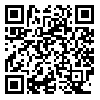BibTeX | RIS | EndNote | Medlars | ProCite | Reference Manager | RefWorks
Send citation to:
URL: http://jhsme.muq.ac.ir/article-1-128-en.html
2- Young Researchers and Elite Club, Qom Branch, Islamic Azad University, Tehran, Iran, Young Researchers and Elite Club, Qom Branch, Islamic Azad University, Tehran, Iran
3- Spiritual Health Research Center, Qom University of Medical Sciences, Qom, Iran., Spiritual Health Research Center, Qom University of Medical Sciences, Qom, Iran.
Background and Objectives: During Ramadan, the ninth month in the Islamic calendar, Muslims abstain from eating and drinking from sunrise adhaan to sunset adhaan. This long fasting period can cause change in certain metabolic and hormonal indices and affect eating behaviors and nutrient intake. Therefore, the purpose of this study was to assess nutrient intake in fasting people in Qom, Iran.
Methods: We enrolled 120 fasting people aged 20-45 years old living in Qom in Ramadan, 2014. A dietary records questionnaire was used to survey the nutrient intake. All questionnaires were collected after three days. The nutrient intake was determined by Nutritionist IV software and then data compared with recommended values.
Results: Energy and macronutrients intake were higher than the recommended values (carbohydrate, 110%; protein, 139%; and fat, 114% of daily values). Except iron (19.8 mg or 108% of daily value), intake of all other micronutrients was lower than the recommended values.
Conclusion: The nutrient intake of fasting people in Qom is not appropriate, and is characterized by increased intake of energy and energy suppliers. Therefore, given the undeniable role of proper and adequate nutrient intake in health, it seems necessary for fasting people to receive nutrition education to enhance nutrient intake from various food groups.
Received: 2016/10/3 | Accepted: 2017/01/7 | Published: 2017/05/31
| Rights and permissions | |
 |
This work is licensed under a Creative Commons Attribution-NonCommercial 4.0 International License. |







